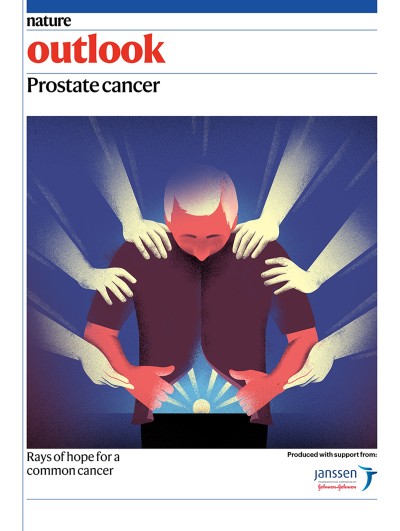Treat the mind, not just the body for prostate cancer
Treat the mind, not just the body for prostate cancer
Treat the mind, not just the body for prostate cancer
The involvement of the prostate gland in sexual function, and the impact of treating tumours in it, make cancer in this part of the body an especially difficult one to deal with psychologically. Miguel Ángel Jiménez-Ríos, a urological oncologist at Mexico’s National Cancer Institute in Mexico City, spoke to Nature about how the psychology of the disease affects screening rates and patients’ quality of life, and how best to address these issues.
How does the psychological burden differ from that of other cancers?
Prostate cancer affects an organ that is linked to masculinity. Treatment can impair sexual and reproductive functions. We use drugs that block male hormones, but these produce mood and cognitive changes. Other treatments can cause loss of erections, weaker orgasms or incontinence. Some treatments even require the removal of the testicles. All these changes can have deep psychological effects.

Part of Nature Outlook: Prostate cancer
In a study of attitudes and beliefs held by Mexican men, which my colleagues and I have not yet published, we found that many are embarrassed by the idea of having a digital rectal examination, and think it would diminish their manhood. Even more thought that people might not be coming forwards for screening because they are afraid of discovering the disease. These observations are consistent with other reports.
What impact does this have on screening and treatment?
First, we think that cultural and gender beliefs related to manliness contribute to the very low rates of screening we see in Mexico. Our research has shown that 40% of men who come for diagnosis arrive after their cancer has spread beyond the prostate, at which point the disease is much harder to treat. By contrast, in the United States, only 8% already have metastatic disease when first diagnosed. But even there, men in Latino communities still typically present with more-advanced disease than white men do.
Second, the men we treat often have high levels of anxiety, depression and insecurity. This can make them less cooperative with doctors, which delays further diagnostic tests and leads to low adherence to treatment regimens. This is why treating the body is not enough. We must also address the psychological burden of prostate cancer.
What are you doing to tackle this problem?
Almost all the international guidelines for cancer treatment ignore the psychological aspects of prostate cancer. But because it is so important, we launched a programme in 2019 that integrates psychology into our practices.
Our approach, which we call OPUS, involves people being systematically assessed not just by an oncologist and a urologist, but also by a psychologist, a nutritionist and other professionals. OPUS is, as far as we know, unique in Latin America. We work with people to improve their physical and mental health, but also to foster their self-esteem, their masculine image and, above all, their willingness to participate in treatment. This psycho-oncology programme accompanies them throughout their treatment, post-treatment and, if necessary, into end-of-life care.
We’re also trying to improve screening rates, in part by promoting awareness of prostate cancer. The Mexican public is not well informed about this disease: around half of the men we canvassed did not know what symptoms they should look out for, and 15% thought that a blood test to look at PSA levels — a predictor of prostate cancer — involved the same procedure as a digital rectal examination. If we can educate people, we might be able to convince more men to come forwards for screening and improve early detection.
Are you achieving what you hoped to?
The COVID-19 pandemic has slowed our research, but we have some preliminary data. We want to give people a better quality of life, as well as a longer one, and the data suggest that our psycho-oncology programme improves people’s ability to manage their anger and stress, and reduces their depression and anxiety.

More from Nature Outlooks
The data from our public campaign to bring more men in for screening, meanwhile, show that cancer had spread beyond the prostate in only 26% of those we diagnosed. This is a significant reduction from 40%, so it seems to be having an effect. However, we still need to reach more men in their forties — not enough people in that age group are coming forward for screening.
Would you like to see more psycho-oncology programmes for prostate cancer?
Yes, this is a call to action for the entire world. When we started this work around 2015, we couldn’t find any oncological programmes that take people’s psychology into account. Our programme could easily be adapted to other settings, and we are already working with other hospitals in Mexico to train their personnel and help them implement comprehensive multidisciplinary programmes of their own.
Prostate cancer causes anguish and fear that stops people coming forward for screening, and often lowers the quality of life for those who are diagnosed. This is a problem that affects people all over the world, and it is important to help them understand that a diagnosis is not a guillotine cutting off their head. There are side effects of treatment, but we can make modifications to minimize some of them, and help people learn to have fulfilling lives despite the others.

Comments
Post a Comment